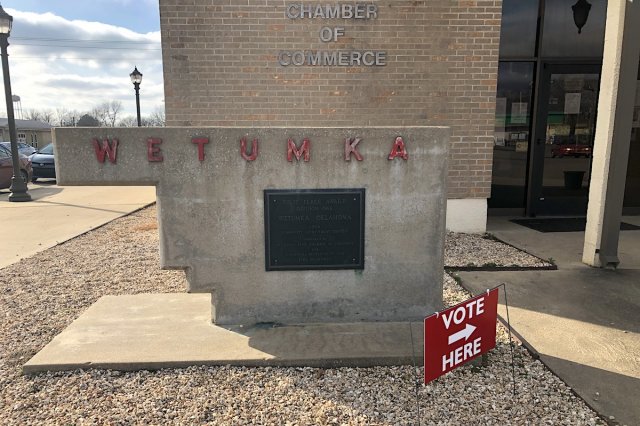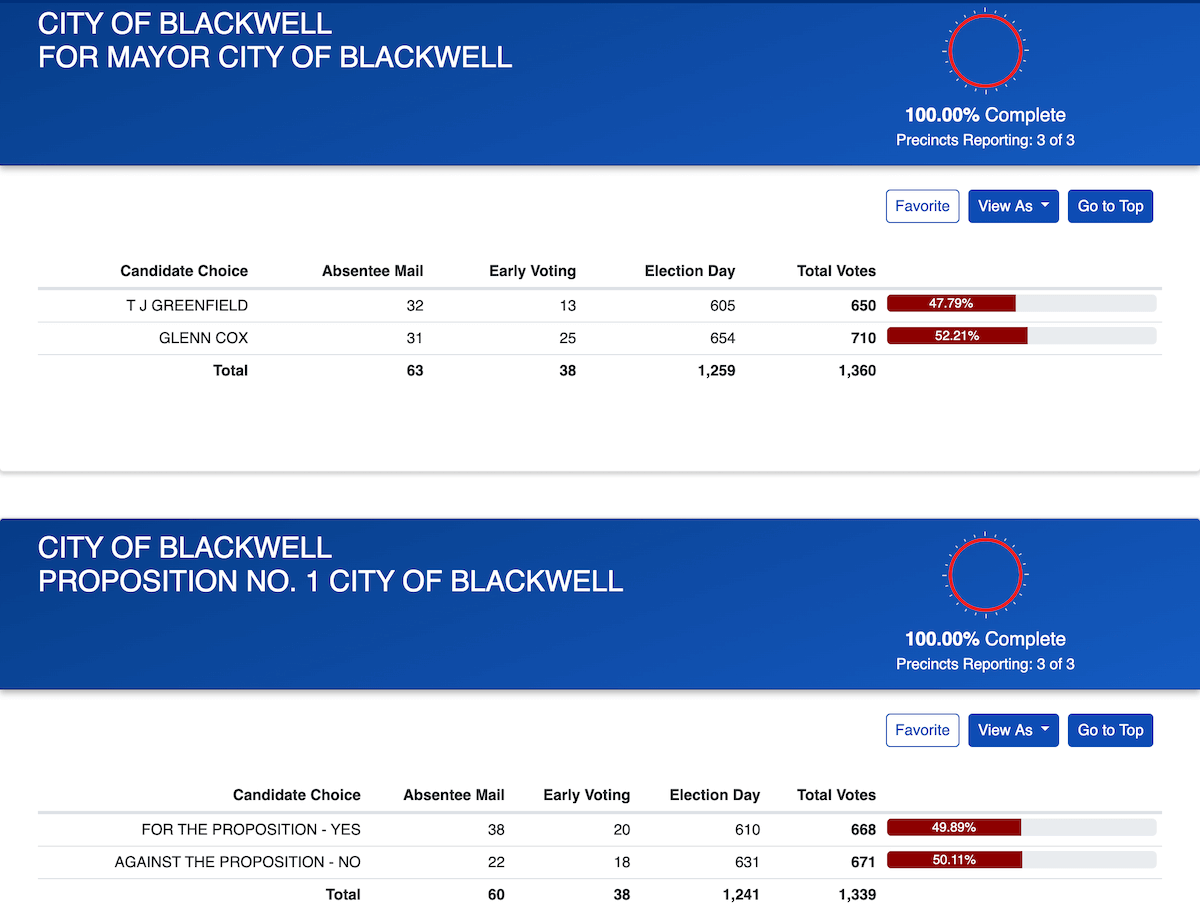

Even in a year without a pandemic, local elections often get lost in the shuffle. However, these elections can have large impacts for the residents of cities and counties choosing new representatives, levying new taxes or changing their form of government.
On June 30, voters across Oklahoma cast local ballots on school board members, city council positions, county sheriffs and clerks and local propositions. Three of those local elections — in Altus, Blackwell and Wetumka — drew NonDoc’s attention.
All results of local elections can be viewed here.
Restructuring in Altus

Residents of Altus voted on 23 propositions making changes to the city charter, the result of two years of discussions among residents about altering their municipal government. Of the 23 propositions, 22 passed with 70 to 80 percent of the vote. But Proposition 12, which would have relaxed residency requirements for the position of city manager, failed by a narrow margin.
The amendments to the charter were proposed by a board of freeholders elected in November 2019. The eight positions were created earlier in the year via ballot measure specifically to examine the city’s charter. The Altus City Council approved the final language for the June 30 ballot, but the Jackson County Election Board website did not post the information online. Under its “Dates/Deadlines” tab, the Jackson County Election Board website lists information for the 2016 election cycle.
In recent years, Altus residents have rejected changes to the charter, including an effort to make the currently-elected positions of police chief, street commissioner and city clerk-treasurer appointed positions. In February 2019, voters rejected a ballot measure that would have revoked the charter entirely, moving the city from its current City Council-City Manager form of government to an Aldermanic form where the mayor takes on most power currently held by the city manager.
According to Gary Jones, a former state auditor and inspector appointed Altus city manager in September, the propositions that passed June 30 included both clarifying amendments and a series of changes altering the relationship between the city manager and the elected officials in the city. The amendments did not make the changes that had been previously rejected by voters.
Proposition 1 changed the official description of Altus’ government from council-manager to charter. This change is mainly semantic, according to Jones, as Altus has had a city charter since 2013 (the same charter the following propositions altered) and will continue to host a hybrid council-manager government. Altus’ three elected positions of city administration (police chief, street commissioner and city-clerk treasurer) are unique, which the term “charter” is supposed to reflect.
Propositions dealing with the roles of those elected officials reflect tensions between those officials and past city managers, according to Jones. Some freeholders drafting the propositions pushed to take the officials out from under the control of the city manager entirely, though they landed on increasing the power of the elected officials in the budget process.
“There’s been some contention,” Jones said. “In fact, I think I’m the ninth or tenth city manager in the last 14 years.”
The main change is in the budget process. While the city manager currently makes the budget for each department with input from department heads and financial staff, the budget will now be crafted by a new committee comprised of the city manager, chief of police, city clerk-treasurer, street commissioner, chief financial officer and city attorney, increasing the power of the members of the committee.
“It’s kind of like a separate government within the government,” Jones said of the committee.
Voters also approved propositions that took the city attorney out from the control of the city manager and placed the attorney on the agenda and budget committees. Jones suggested this could potentially present a conflict of interest, as the attorney would be sitting on the committee they were tasked with representing. In general, Jones cited concern with many of the structural changes increasing the power of elected city officials.
“There’s not anything that I think is gonna have a real big positive effect,” Jones said. “While I don’t have a problem working with the elected officials, I can see in the future where it may be problematic for someone else, just because of the structure and the way it’s set up.”
The other major proposition regarding the city manager — Proposition 12 — would have allowed them to live outside Altus city limits and would have given new city managers a grace period for moving within that area. Currently, the city manager must reside in Altus city limits. This was the only proposition voters rejected.
According to Jones, this issue arose following his appointment to the position. When he was named interim city manager in 2019, he lived about 40 miles outside the city. Though he has since purchased a house in Altus and has been appointed to the position permanently, the proposition was designed to give the Altus City Council more leeway in appointing future managers.
“Obviously, the citizens chose that they want the city manager to live here,” Jones said of Proposition 12’s rejection.
Jones said he isn’t taking the vote personally.
“Someone made a comment, ‘Oh they voted against you.’ I said no, it technically eliminates my competition. I already live here,” Jones said.
Another set of propositions further regulated the council, including implementing a provision for councilmembers to be removed if they cease to be a resident of the ward they represent, limiting reimbursement expenses for councilmembers and the mayor and requiring the council to investigate “matters of criminal, financial or personnel abuse, or hostile work environments.”
All elected officials were added to the list of individuals who must avoid conflicts of interest when selling something to the City of Altus. In the event of a conflict of interest, officials may have to forfeit their office.
In election procedures, Altus candidates will now be required to file a declaration of candidacy with the Jackson County Election Board. Primary elections are required to be held on the second Tuesday in February in every odd-numbered year, and general elections will be held on the first Tuesday in April in every odd-numbered year, ensuring election dates line up with current election laws. Because local elections are non-partisan, a general election will only be required if more than two candidates file. In that case, as is standard practice, the top two candidates from the primary will advance to the general.
A collection of other propositions changed phrasing or fixed previous grammatical errors made in the document.
Blackwell rejects propositions, votes out mayor

A trio of city propositions were considered by Blackwell voters on June 30, but all failed to pass. The Kay County community also ousted Mayor T.J. Greenfield, with 52.2 percent of voters selecting political newcomer Glenn Cox. Greenfield had found his name in headlines last year when state law changed and forced him to relinquish his medical marijuana dispensary. The Blackwell City Council also released a report about Greenfield’s former concrete company being paid for municipal services. Greenfield had called the report biased.
“I can’t wait to get started,” Cox told Jordan Green of the Blackwell Journal-Tribune. “I’m ready to get everybody together and go to work. Hopefully we can change things around here and get our whole city together.”
Cox is a retired dispatcher for the Blackwell Police Department, and he has formerly worked in oil and gas, according to the newspaper.
Of the three propositions on the June 30 Blackwell ballot, the first sought to amend rules on the bidding process for service contracts and other city expenditures of more than $5,000, and the second would have allowed the city manager greater freedom to receive bids from contractors without prior Blackwell City Council approval.
A Facebook post made on the City of Blackwell’s official page says Proposition 1 would have raised the threshold from $5,000 to $50,000 for city purchases to require “newspaper advertisement and sealed bids.” The current city charter states that, for all expenditures equal to or greater than $5,000, the City Council is required to publish a newspaper ad outlining the expenditure’s purpose and calling for sealed bids from parties interested in fulfilling the contract. The council must also “have first procured specifications” of any contract before expenditures are approved. Proposition 1 sought to raise the threshold to apply these limitations only to purchases of $50,000 or more.
On June 29, the city posted a Facebook live stream of a town hall explaining Propositions 1 and 2. Commenters on the video shared mixed opinions, with one writing that Blackwell “will have no money left before you know it” if the city manager were allowed to “spend $50,000 at a whack.” Another commenter wrote that the proposition would save time in the event of emergencies by allowing the city manager to “get the ball rolling” without the City Council approving individual bids from contractors and waiting for a newspaper ad to be posted.
The vote on Proposition 1 was originally reported to have ended in a 668-668 tie, but online results from the Oklahoma Election Board now display a 668-671 count rejecting the proposal.
At the town hall, Blackwell City Manager Janet Smith said Proposition 2 would have allowed the city manager to independently receive bids and “start relationships” with contractors on services up to $50,000, but the City Council would still need to approve expenditures after reviewing bids submitted by the city manager. Proposition 2 was narrowly defeated in a 648-678 vote.
According to the city’s Facebook post, Proposition 3 would have amended the city charter to state that the city manager, municipal judge, city attorney, chief financial officer and city auditor are to be appointed by the City Council. All other city-level appointments were to have been left in the hands of the city manager.
Currently, the city charter states the city manager is expected to hire, discipline and remove “all heads of departments and all subordinate officers and employees of the city” except the municipal judge and the city attorney. The proposition was decisively defeated, 491-842.
Wetumka fills council seats after long vacancies

The town of Wetumka spent several months of 2020 without a full City Council after the resignations of three members Jan. 31. Two of those former councilmembers have since been charged with crimes related to child pornography.
Wetumka was set to select its three new councilmembers in April, but the COVID-19 pandemic led to that election’s postponement. When ballots were finally cast June 30, just more than 200 town residents elected Donna Dyer, Richard Roush and Joshua Howk to fill the remaining terms of three citywide council seats.
Dyer runs the East Central Oklahoma Family Health Center, which is a federally qualified health center that accepts insurances and offers the uninsured care on a sliding fee scale.
“A big thank you to everyone who supported me. It seems like it had been a long time coming,” Dyer wrote June 30 on Facebook. “It is time to move forward and work together for the good of Wetumka.”




















